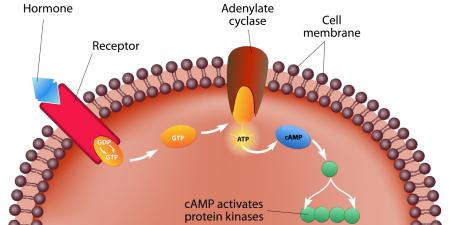Case
Mr. and Mrs. Malcolm are worried about the growth of their 5-year-old son, David. David was the shortest child in his preschool classes, and his parents worry that, as he enters kindergarten, he may be teased for his shortness. Looking ahead, they fear all kinds of other consequences; competitive sports could be closed to him, and dating and job finding could be more difficult than for his taller contemporaries. Mrs. Malcolm is 5 ft tall, and Mr. Malcolm is 5 ft 4 in. They have expressed their concerns over the course of David's last few pediatrician visits. The pediatrician, noting in David's chart that he has been approximately 3 standard deviations below the mean for height since 18 months of age, refers the Malcolms to Dr. Tyson, a pediatric endocrinologist.
Dr. Tyson orders several tests to determine whether David's short stature is due to an underlying pathology (eg, Turner's syndrome, renal insufficiency) or growth hormone deficiency. All tests come back negative. After a radiological evaluation, Dr. Tyson concludes that David has idiopathic short stature (ISS), specifically, familial short stature; he is short because his parents are short. The Malcolms are relieved that David does not have a serious illness, but their fears and concerns are not abated by Dr. Tyson's diagnosis. Mr. Malcolm recalls the pain of being a short teen and still feels that people look at him awkwardly when they first meet him. A lawyer, he prefers to do most of his initial client interviews by telephone. Mrs. Malcolm doesn't want her son to be shorter than girls his own age, and she fears that he could be psychologically scarred as he gets closer to puberty.
The Malcolms tell Dr. Tyson that they have read on the Internet that human growth hormone therapy (hGH) is safe and effective for children like their son. They are eager to get David's therapy started as soon as possible and ask Dr. Tyson to prescribe the treatment for him. When Dr. Tyson begins to tell them that most insurance companies do not cover GH therapy for ISS cases, Mr. Malcolm declares that they have decided to look at the therapy as an investment in David's future, as important as private school education, if not more so.
Commentary 3
FDA approval for growth hormone (GH) therapy for individuals with idiopathic short stature (ISS) has made cases like this one commonplace for pediatric endocrinologists. GH treatment has received much media attention, and parents are exploring it as an option to increase stature in their short children with no medically recognized growth deficiency. In considering GH treatment of a normal child, Dr. Tyson faces some ethical dilemmas. The first is efficacy. Pediatric endocrinologists disagree as to whether or not GH treatment actually increases growth in ISS and results in taller adult stature. Dr. Tyson is obligated to evaluate the literature critically to determine whether GH will be an effective treatment for this patient. If not, he should not prescribe it. A frequently quoted study funded by the pharmaceutical industry demonstrated that short-statured normal children on GH ultimately achieve adult heights that are an average of 5 cm taller for boys and 5.9 cm taller for girls than their predicted adult height without the hormone.1 This represents a minimal increase in height; these children were still short as adults. Of note, a group of children in this study did not increase their adult height at all after having been subjected to daily GH injections for an average of 5.5-6 years.1 Critical review of this study shows that the group of children with low insulin growth factor-1 (IGF-1) levels grew better on GH than those with normal levels whose adult height did not increase. In this instance it is likely that GH was effectively treating a biochemical abnormality.
Assuming that Dr. Tyson thinks that David is likely to be taller if he is treated with GH, the second ethical point to consider is the risk/benefit ratio of this treatment in patients with ISS. When used for other indications, GH appears to be safe. The metabolic consequences of GH used in ISS has been studied (again with pharmaceutical company support) with no adverse effects reported after 5 years.2 However, since no long-term studies have been done, the potential for unforeseen complications exists. Psychological factors to consider include trauma associated with daily injections; treatment may also reinforce a negative self-image or generate a perception that short stature is a disease or disability.3
What are the benefits of effective treatment? Severe short stature can pose physical limitations in a world that is geared to the average-sized individual. Driving a car or working at standard height desks and counters can be a challenge for the very short adult. Mr. and Mrs. Malcolm are convinced that short stature is associated with many other disadvantages, and Mr. Malcolm attributes his own difficult social interactions to his short stature. The couple is concerned that David will be psychologically scarred by his short stature and assumes that GH treatment leading to taller stature will improve his psychosocial well-being. Although this notion has been a widely held, current data indicate that the psychological functioning of children and adults with short stature is indistinguishable from that of their peers. Moreover, studies do not support the claim that quality of life is improved after GH therapy.4,5
Dr. Tyson should also consider whether providing David with GH is therapy or enhancement. GH therapy is routinely prescribed for children with GH deficiency, where there are few ethical dilemmas because GH is being used to treat a disease or disorder. Children with Turner's syndrome and renal insufficiency are not GH-deficient, but since they grow better on GH it is routinely prescribed as part of standard therapy in these conditions. The therapy/enhancement question is a tough one because children with ISS, though "normal," are as short when they are adults as those with GH deficiency, Turner's syndrome, and renal insufficiency. Consequently, it seems reasonable to establish a minimum adult height below which one experiences physical limitations and, from there, to say any child who is unlikely to achieve a height above this minimum should be a candidate for GH therapy, regardless of diagnosis. The FDA arbitrarily approved GH for treatment in ISS of children whose predicted adult height fell below the first percentile, ie, lower than the height of 1 percent of adults. However, the height below which short stature is a true disability has not been determined and should be investigated. Moreover, the goal of treatment should be to achieve a normal adult height, not the maximum height that an individual can obtain. Once a child reaches a height at which his or her projected adult height is no longer associated with disability, GH should be discontinued. This approach attempts to prevent disability and normalize—rather than enhance—stature.6
Social Inequities
Matters relating to social justice should not be overlooked in the ethical analysis of GH treatment of short stature. The economic consequences of such treatment are significant. The annual cost of treatment of all children whose height falls below the first percentile for any reason including ISS, approaches $4 billion.6 When millions of Americans have no access to health care, should making healthy children taller be a priority? Currently, few insurers pay for GH treatment of ISS. But if society continues to medicalize short stature, insurers may be forced to pay for GH for all short children. For now, GH treatment for ISS is essentially available only to those, who, like the Malcolms, can afford to pay for it. If this inequality in access to GH were to continue, the already disadvantaged poor would become the shortest members of society.
Looking at the big picture, it's true that no matter how effective and accessible GH therapy is, someone will always be the shortest. By recommending GH treatment for ISS, society sends the message that taller is better and endorses prejudice against whoever is shortest—no matter what his or her actual height is.
After careful review of the medical and ethical issues involved in this case, Dr. Tyson might assess this case as follows. David meets the FDA indication for GH therapy in ISS since his predicted adult height falls below the first percentile. A review of the literature suggests that it is unlikely that GH will benefit David since his tests, including IGF-1, are completely normal. Even if it were to benefit him, the expected increase in his height would be minimal, and he would still be a short adult. Current data does not support the theory that short stature impacts psychosocial well-being and, although the short-term risks of GH appear low, long-term risks are unknown. David may perceive that treatment of his short stature indicates that he has a serious disability, and this may reinforce a negative self-image regarding his stature. On a societal level, Dr. Tyson must also consider the cost of treatment, unequal access to GH, and the "medicalization" of short stature. Weighing the potential risks—both social and medical—against the lack of evidence that David will either grow significantly taller or have improved quality of life if he does attain taller stature, Dr. Tyson can confidently conclude that GH treatment is not warranted.
How do I honestly think Dr. Tyson will fare in this matter? He will present all of this information to Mr. and Mrs. Malcolm who will still be adamant that their son be treated with GH even if there is only a small chance that it might make him taller. Dr. Tyson will suggest that they monitor David's growth and re-evaluate him in 1 year and agree that he will continue to review the medical literature regarding treatment of ISS and notify the Malcolms of any new information. The Malcolms will leave the office, obviously unhappy with Dr. Tyson's recommendations. The next day they will call and request that David's records be forwarded to another pediatric endocrinologist whom they will consult for a second opinion.
References
- Hintz R, Attie K, Baptista J, Roche A. Effect of growth hormone treatment on adult height of children with idiopathic short stature. Genentech Collaborative Group. N Engl J Med. 1999;340(7):502-507.
- Saenger P, Attie KM, DiMartino-Nardi JW. Metabolic consequences of 5-year growth hormone (GH) therapy in children treated with GH for idiopathic short stature. Genentech Collaborative Group. J Clin Endocrinol Metab. 1998;83(9):3115-3120.
- American Academy of Pediatrics Committee on Drugs and Committee on Bioethics. Considerations related to the use of recombinant human growth hormone in children. Pediatrics. 1997;99(1):122-129.
- Voss LD, Sandberg DE. The psychological burden of short stature: evidence against. Eur J Endocrinol. 2004;151(Suppl 1):S29-S33.
- Sandberg DE, Voss LD. The psychosocial consequences of short stature: a review of the evidence. Best Pract Res Clin Endocrinol Metab. 2002;16(3):449-463.
- Allen D, Fost N. hGH for short stature: ethical issues raised by expanded access. J Pediatr. 2004;144(5):648-652.



